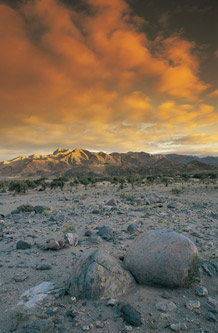
Dry landscape
The novel in a time of climate change
The past five years have seen a significant increase in novels focusing on climate change.
Novels by renowned writers such as Margaret Atwood, Ian McEwan and Doris Lessing have all tackled this complex issue.
The multi-faceted nature of climate change as both a scientific and cultural phenomenon has resulted in an increasingly radical and experimental approach to plot, character, setting and structure in the contemporary novel.
Researchers at the University of Exeter are leading the way in the literary analysis of climate change as a cultural phenomenon. Dr Adeline Johns-Putra, Senior Lecturer in English at the University of Exeter’s Cornwall Campus, is working with Dr Adam Trexler, a postdoctoral research fellow in English, to explore how and why literature is changing in response to climate change. Dr Johns-Putra and Dr Trexler are working with scientists and geographers from the University on a cross-disciplinary project funded by the European Social Fund, entitled ‘From Climate to Landscape: Imagining the Future’. They are also participating in a conference entitled ‘New Climes: Critical Theory, Environmentalism and Climate Change’, which will see leading humanities’ academics debate the role of literary theory in understanding climate change, on Monday 13 June, at the Cornwall Campus.
The complexity of climate change is a challenge to conventional modes of representation, and writers are responding with innovations in character and plot, according to Dr Johns-Putra.
She said, “Popular climate change novels such as the ‘Science the Capital’ trilogy by renowned science fiction writer Kim Stanley Robinson provide an excellent example of this. Robinson overturns our expectation of how novels work because of the demanding nature of his subject matter. For instance, most novels rely on a hero. Yet, Robinson gives us no obvious hero, no simple caricature of the scientist who will either save or destroy the world. Instead, he produces an ensemble cast. The trilogy’s collective hero is the community of scientists, or indeed science itself, rather than just one person.”
Robinson challenges ideas of plot development and setting, inserting meticulous descriptions of scientists, politicians and funders, who are the actors on the expansive platform that climate change demands, she added. Even the impressive length of the trilogy is unusual in contemporary popular fiction, as he returns to ideas of the epic novel in order to deal with the massive scale of the problem of climate change.
Dr Johns-Putra said, ”Rather than a linear narrative working to a dramatic ending or resolution, there is no obvious conclusion or solution offered by writers like Robinson. Writers such as Robinson show that there is no utopia when it comes to the current environmental crisis. For Robinson, utopia is what he would refer to as a work in progress rather than an end result.”
Dr Johns-Putra’s research has so far been published in the two journals, the WIREs Climate Change and English Studies. It was also presented at the fourth Utopias conference 2010 in Melbourne, Australia, at which Robinson was an invited speaker. Robinson, one of science fiction’s most distinguished and acclaimed writers, has often made clear his views on the need for academics in the sciences and humanities to work together to understand climate change.
Robinson said “Climate change will be the overriding story of the twenty-first century, and everyone alive today and for years to come will have to deal with it. It is by nature a multi-disciplinary effort, and no matter what you are interested in or what gives your life meaning, climate change will become a part of it. So it's best to start telling the stories as soon as possible, to prepare ourselves for the inevitable changes we have already set in motion."
Date: 13 June 2011
